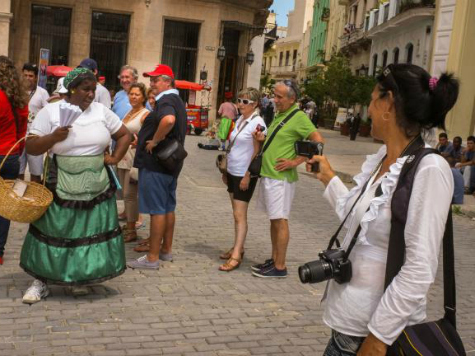
Harvard is expanding its travel programs to Cuba, advertising a “people to people” voyage for alumni in October that promises “an astute insight and deeper knowledge of Cuba’s history and people” through meetings with professors, docents, and the kind of “local resident” the Cuban government trusts to interact with Americans.
In an email to alumni, the university encourages responses from those interested in traveling to Cuba “as soon as possible,” and excitedly notes, “the time to travel to Cuba is now!” The program offers an “exploratory” trip focused mostly on Havana and an “in-depth” trip that covers all six provinces.
The program description does warn that the provisions by which the United States allows Harvard to provide this trip are rigid and demand that every hour of a traveler’s time be accounted for. “Travelers must participate in all group activities, which may include lectures, roundtable discussions and break-out sessions, private performances, artistic demonstrations and interpretations, and informal conversations, all delivered by local Cubans,” the description on the website notes.
The website illustrates the program with colorful photos of a dilapidated Havana, children on rusty bicycles, and the antique car kitsch the Cuban government regularly uses to attract tourists. Nowhere on the site does Harvard note that Cuba is a state sponsor of terror, nor the lack of fundamental human rights the Castro dictatorship has imposed on its people for decades.
Instead, the advertising for the program sounds much more like the legal tourist programs abroad in places like Canada, where tourists are offered a view of “five decades of resilience, progress, allegiance to peace and social equality with the people of Cuba.” While the language is slightly more tempered to fit the bounds of legality, the program has, since its inception, highlighted the so-called upsides to the impoverished communist country with little notice of the nation’s severely marred past and present.
Harvard first received a license to send students on study abroad trips to Cuba in 2006 for spring 2007, and then promised a “unique intellectual opportunity” to students to, among other things, “hear some of the world’s greatest music – live!” It was not the first time since the Revolution that Harvard students would find their way to the communist nation – two students were indicted in 1963 for visiting the island – but it was the first time the university had so enthusiastically advertised a Cuban program. Concern for Cuban exile students who may have been offended by the glib language surrounding the program was nowhere to be seen, nor any word on the work Cuban exile students were doing in the late 2000s to promote the cause of freedom in Cuba.
And so the program has continued and expanded over the years, becoming more and more of a liability for the university as the Cuban government expands its nefarious influence throughout the continent. While the Cuban government’s routine abuses on its people and maintenance of a political prisoner system should be objectionable enough to keep every American home, Cuba is no longer a problem to just Cubans.
Its State Sponsor of Terror label has been well earned through the government’s support of the Revolutionary Armed Forces of Colombia (FARC), a guerrilla group that began as a violent Marxist terror group but is now, though equally dangerous, more of a violent drug cartel. Those that have orchestrated major attacks are welcomed in Cuba and not to be extradited, free to release Marxist rap songs with other terrorists taking refuge in the country.
Cuba has also tightened its grip on the Venezuelan government, where Cuban officers are flown in to teach the Bolivarian National Guard how to properly beat and torture student protesters, as well as lend a hand with intelligence training. The Venezuelan government has explicitly said that Cuban officials are “here to stay” and accused protesters who have noted the presence of Cubans in many government abuses of racism.
This is all to say that Cuba is a significantly hostile environment to Western ideals and Americans specifically, but you would never know that from the people trying to take $5,000 from you to fly you in. There is a gross irresponsibility to not taking the threat of the Cuban government seriously, and an additional disrespect to Cuban exiles who have become an inextricable part of the cultural fabric of this nation by necessity, thanks to the oppressive violence of their former home country. That Harvard has not taken steps to address these concerns, tacitly dismissing them as extreme, betrays the disingenuous nature of the program.
Breitbart News reached out to the Harvard Alumni Association for comment but received no response as of the time of publication.

COMMENTS
Please let us know if you're having issues with commenting.